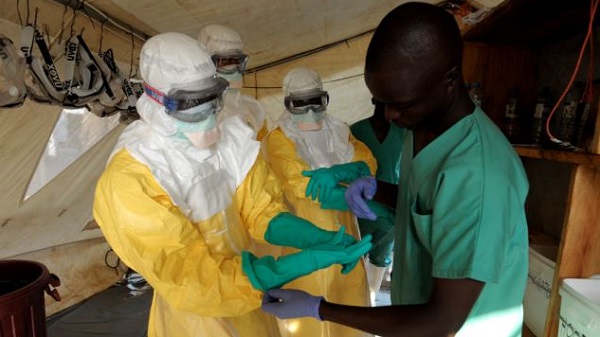The Boundaries of Treating Ebola
Main Article Content
Abstract
On July 29th, 2014 the doctor who was leading the charge in Sierra Leone against Ebola, Sheik Umar Khan, was pronounced dead. The man who had dedicated his life to fighting the Ebola outbreak had been fighting for his own life against the virus. Just days earlier, two relief agencies – Doctors Without Borders and the World Health Organization – were deciding on whether to give the doctor a drug which had never been tested on people.
Dr. Khan would be the first person on the planet to receive this experimental drug for Ebola, known as ZMapp. According to the U.S. Center for Disease Control (CDC), “it is too early to know whether ZMapp is effective, since it is still in an experimental stage and has not yet been tested in humans for safety or effectiveness.”[1]
According to those who made the decision, the doctors feared fueling the suspicions of the already distrustful African populace, a move which could make treatment and containment for difficult. If Dr. Khan was to die when being treated with ZMapp the public could become more doubtful of Western relief groups. Dr. Khan’s virus levels were also reported to be extremely high and the doctors were thereby convinced that the drug would not be efficacious.
However, doses of the drug have been given to two American aid workers along with a 75-year-old Spanish priest who had been evacuated from Liberia. Mapp Biopharmaceutical, the pharmaceutical corporation that developed the drug has claimed that after sending ZMapp to West Africa, there are now no remaining supplies of the drug. Furthermore, according to recent estimates from U.S. officials there may only be a couple hundred doses available in the next few months.
The question remains: who gets to use the experimental drugs?
It may seem political at first, as if the life of an African is less worthy than the life of a Westerner. However, there already is a vivid history of controversy regarding drug testing in Africa, and some workers worried that releasing the drug to West African civilians and workers would resemble recent unethical research trials. After a meningitis outbreak in 1996, Pfizer settled charges which claimed the company failed to observe ethical standards in testing an experimental antibiotic. In the same vein, some may claim that ZMapp and Western nations have an ethical obligation to not administer the drug due to its experimental nature. Others may claim this is simply a public relations stunt in order to save face and ensure history does not repeat itself.
Perhaps the drug should go to healthcare workers instead, as they will adequately understand the risks and harms of taking an experimental drug. Additionally, offering the drug to healthcare workers may give incentive to continue working in high risk areas, where they are needed most.
While many are interested in who will get the experimental drug, perhaps the better question is the following: are Western nations doing all they can to fight the outbreak?
Pushing economic and national interests to the side, one must examine the current ethical obligations affluent nations have towards the less affluent. In 2005 the World Health Organization created International Health Regulations developed in response to a SARS outbreak. [2] This effort has not been completed as of yet, mainly due to lack of priority and funding.
Creating an international fund to stem outbreak and create local disease-response centers (which the current Ebola-stricken countries lack) would be a good start. Furthermore, affluent governments should be investing additional aid to allow for more ability to curtail epidemics like Ebola. Pooling multinational resources and funds together will also allow for the ability to direct aid and focus it on where it is necessary. Thus far, only Doctors Without Borders and the World Health Organization have been aiding in the fight. Both of these organizations are relief agencies, however much more could be done with multinational efforts from organizations such as the CDC, the European Centre for Disease Prevention and Control, the Public Health Agency of Canada, and many others from affluent nations.
Investing more money into drugs to fight these outbreaks will ensure healthcare workers are much more prepared. Countries such as Sierra Leone, Guinea, and Liberia cannot be expected to manufacture and test these drugs when focusing many resources on prevention. This is not to say that these countries are not accountable as well, especially when one takes note of the fact that they continue to favor military spending over investing in public health infrastructure. Nevertheless, the same could be said for a country like the United States, in regard to its internal ratio of military to public health spending, along with the external ratio.
While one can debate administering drugs such as ZMapp and whether such action is prudent and just, one must also ask why this is the only current option.
The outbreak has already killed over 1,000 people and is showing no signs of ceasing. If this outbreak was occurring in a Western Nation there would most likely be a much stronger impetus to contain and halt all infection.
When examining bioethical issues and asking who deserves treatment, it is important to look to the root cause of the reasons as to why people are not receiving treatment. Increased funding, coordinated multinational efforts, and investment into research can save the lives of many human lives.
When fighting a deadly epidemic like this, it is important to know that disease knows no national boundaries, and neither should we.
REFERENCES
[1] Prevention, C. (2014). Questions and Answers on Experimental Treatments and Vaccines for Ebola. Ebola Hemorrhagic Fever. CDC. http://www.cdc.gov/vhf/ebola/outbreaks/guinea/qa-experimental-treatments.html
[2] World Health Organization. (2008). International Health Regulations (2005). World Health Organization.

